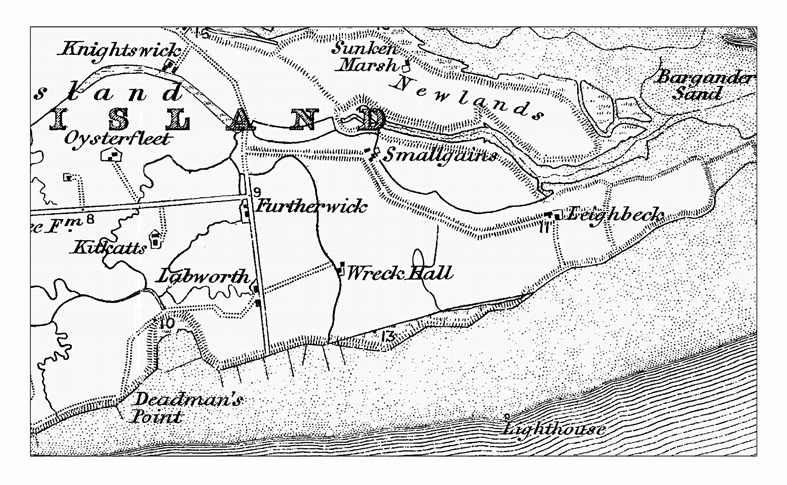The story of Wreck Hall gives a good indication of the ways and vagaries of Canvey land and property deals, when the estate changed hands over the centuries: ‘Rack Hall alias Wreck Hall alias Southchurch Marsh in the parish of Southchurch (the Southchurch part of Canvey), situate at the south-east side of the island (formerly consisting of 40 acres), is all third-acre land,’ wrote Philip Benton in his History of the Rochford Hundred in 1867. Third Acre land was land once owned by the Dutch embankers.
On 13 December 1687 Wreck Hall was acquired for ‘one thousand years’, but on 3 December 1794 a Mr and Mrs Scrivener and their daughter sold it to Ralph Robinson for £150: ‘Assignment of an estate in the Isle of Canvey in Essex for the remainder of a term of one thousand years…’.
12 June 1818, from the will of Ralph Robinson it was sold by his heirs to D.F.K.P. Nash (Daniel Francis Knowlton Pitchford Nash) for £1,160. Witnesses were Ann Robinson, Charles Robinson, George Robinson and Ralph and William Moore ‘otherwise Robinson’.
On 18 November 1857 Daniel Nash passed it on to William Clark of Mucking Hall, who borrowed £1,200 from C.M Baily.
On 19 January 1894 Wreck Hall Farm was assigned to Arthur Mayhew Clark, again for the ‘residue of a term of 1,000 years’.

Wreck Hall was still marked on maps of 1884, but the first Canvey census of 1881 already lists it as ‘uninhabited’.
On 28 August 1903 A.M. Clark of Stanford-le-Hope, gentleman, borrowed £600. (Business must have been brisk, the debt was settled by 14 January 1904.) The document mentions the farm known as Wreck Hall Farm, Canvey Island, ‘which is now being dealt with as building estates…’ On 8 September 1924 A.M. Clark stated he had ‘known Wreck Hall Farm for upwards of fifty years and sold portions of it for the last thirty years’. When the thousand years are over, on 13 December 2687, will a Dutchman knock on Canvey doors, demanding the return of his rights to the land?
It is thanks to the historian Benton that we can flesh out this dry list of researched facts. The story also underlines the sometimes profitable effects of inebriation. According to Benton, Wreck Hall Farm had been purchased by Ralph Robinson of Horndon for 100 guineas. (The price of £150 may have been confused in the telling.) This was resold in 1815 at the Bell Inn, Horndon-on-the-Hill, by members of the Robinson family to Daniel Nash, the grandfather of the proprietor of the Bell Inn in Benton’s time, for £1,300 (actually £1,160, but there may have been other expenses. RH). Prior to the event the Robinson family had made up their minds to let Wreck Hall Farm go for £800, but ‘the company being stimulated by a copious circulation of sherry, and a competition springing up between Nash and Wilson of Rochford Hall, the result was as above stated.’
They say ‘money talks’. In this tale money walked. When the purchase price was paid over at the Lion Inn, Rayleigh, to William Jeffries (lawyer?) and Charles Robinson (then of Horndon), it was deposited in the boots of the recipients ‘for fear of footpads’.
Wreck Hall itself had a great story to its name. In Philip Benton’s words, ‘the farm took the name of ‘Wreck Hall’ from the circumstance of Ralph Robinson purchasing of the underwriters the wreck of the ‘Ajax’ (which was driven on the shore opposite ‘Burgess House’ at South Shoebury), and applying the timbers to the construction of the premises. The Robinson family at that time inhabited Burgess House, whither the present Charles (now in extreme old age) was removed when six weeks old, from Southend in a chest of drawers.’
(The Bell Inn at Horndon-on-the-Hill is still today a well-favoured watering hole. The Nashes were a wide-spread – and successful – family of property owners.)
Wreck Hall (Hester called it Ryswyk Park), like Oysterfleet Farm and Leigh Beck, shows up on the early Hester plan for Canvey Island.




Comments about this page
I would be very grateful if anyone could tell me when the Ajax was wrecked on South Shoebury. Ancestors of mine, the Morley family farmed from Wreck Hall from about 1826 or earlier, to about 1863, when Edward Morley died – his sons all having left home for the Hackney and stoke Newington area.
Add a comment about this page